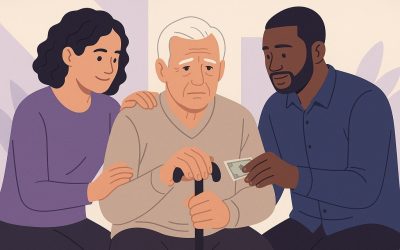Turning 65 is a significant milestone — one that brings both celebration and questions about your future care and support. If you’re currently receiving the Disability Support Pension (DSP) or are an NDIS participant, you might be wondering: Does disability pension stop at 65?
The short answer is no — it doesn’t automatically stop. But what happens next depends on your personal situation, the type of support you receive, and whether you choose to transition to the Age Pension or continue with your NDIS plan.
In this guide, we’ll explain how disability pensions work after 65, what changes you might expect, and how Premier Home Care Sydney can help you navigate this important life stage.
What Happens to Disability Support Pension When You Turn 65
The Disability Support Pension (DSP) provides financial assistance to Australians with a permanent physical, intellectual, or psychiatric condition that prevents them from working.
When you approach 65 years of age, you become eligible for the Age Pension — but that doesn’t mean your disability pension stops automatically.
Services Australia will send you a letter or online notification about 13 weeks before your 65th (or current Age Pension age, which may be 66 years and 6 months) birthday, inviting you to choose whether to:
-
Stay on the Disability Support Pension, or
-
Transfer to the Age Pension.
You must inform Services Australia of your decision. If you don’t respond, your DSP payments may stop temporarily until you confirm your choice.
Can You Stay on the Disability Support Pension After 65?
Yes — you can continue receiving the Disability Support Pension after 65 if you wish. Many people choose this option because it offers benefits specific to disability-related needs.
Some of the advantages of staying on the DSP include:
-
Higher rates of mobility allowance
-
Eligibility for the Pensioner Education Supplement and Education Entry Payment
-
Access to Incentive Allowance if you’re in supported employment
-
Higher rent assistance rates for those living in shared private accommodation
However, if you plan to travel overseas for an extended period, note that DSP payments are paused after 28 days (whether it’s one trip or multiple trips across a year).
What Happens If You Transfer to the Age Pension
If you choose to move from the Disability Support Pension to the Age Pension, there are some key differences to be aware of.
The Age Pension is designed for older Australians who have reached the qualifying age and meet the residency and income requirements. Once you switch, you no longer have to undergo DSP medical reviews or eligibility assessments.
Benefits of the Age Pension include:
-
No limits on voluntary or community work
-
Access to the Work Bonus, which allows you to earn additional income without reducing your pension
-
Continued Carer Allowance for your partner (if applicable)
-
Extended travel time overseas — up to 26 weeks before payments are affected
While you’ll lose access to some disability-specific supplements (like the Pensioner Education Supplement), the Age Pension provides more flexibility in lifestyle choices and travel.
Does the NDIS Stop at 65?
e answer depends on whether you were already an NDIS participant before turning 65.
-
✅ If you were already part of the NDIS, you can continue receiving supports after 65.
-
❌ If you were not an NDIS participant before 65, you cannot apply for new NDIS funding after that age.
The NDIS focuses on empowering people with disabilities to live independently and participate in their communities. Once you turn 65, you may also become eligible for aged care supports under the Commonwealth Home Support Programme (CHSP) or Aged and Disability Care services — both of which can complement your existing NDIS plan.
NDIS vs Aged Care: Understanding the Difference
It’s important to understand how the NDIS and Aged Care systems differ once you reach retirement age.
What Happens If You Acquire a Disability After 65
If you develop a disability after turning 65, you unfortunately cannot join the NDIS. Instead, you’ll need to access assistance through My Aged Care or other government programs such as:
These programs focus on helping older adults stay independent, safe, and supported at home, whether you require temporary help after an illness or ongoing assistance for daily living.
How to Decide Between Disability Pension and Age Pension
Choosing between staying on the Disability Support Pension or moving to the Age Pension can be confusing. Here’s a quick summary to help you decide:
Stay on the Disability Pension if you:
-
Still require disability-specific allowances or supplements
-
Are studying or working in supported employment
-
Prefer the higher mobility allowance
-
Plan to travel only short-term
Transfer to the Age Pension if you:
-
Want simpler eligibility and no ongoing assessments
-
Want to take advantage of the Work Bonus
-
Expect to travel overseas for longer periods
-
Are ready to transition into retirement-style benefits
If you’re unsure, it’s a good idea to speak directly with Services Australia or a trusted care coordinator before making a decision.
What to Do When You Turn 65: A Step-by-Step Overview
-
Watch for Your Notification
Around 13 weeks before your 65th birthday, Services Australia will contact you with options. -
Review Your Options Carefully
Compare the pros and cons of staying on DSP versus switching to Age Pension. -
Discuss with a Care Advisor
If you’re part of the NDIS, consult your support coordinator or NDIS Provider for advice. -
Submit Your Decision
Inform Services Australia whether you wish to remain on DSP or transfer. -
Explore Aged Care Services
Consider applying for the Commonwealth Home Support Programme (CHSP) to access domestic and community care options as you age. -
Stay Supported
Partner with a trusted care provider like Premier Home Care Sydney to ensure your ongoing wellbeing, independence, and comfort.
How Premier Home Care Helps Older Australians Transition Smoothly
At Premier Home Care, we understand that aging brings new challenges — but it also brings opportunities for continued independence and quality of life.
Our compassionate care team helps you:
-
Understand and manage your NDIS or Aged Care plan
-
Receive ongoing support for daily living, personal care, and companionship
-
Access Respite Care to give family members a break
-
Stay safe and independent through Home Care Services
-
Navigate government programs like the Commonwealth Home Support Programme
We make the transition between disability and aged care systems seamless, ensuring you continue to receive the help you deserve.
Frequently Asked Questions (FAQs)
1. Does disability pension stop at 65 automatically?
No, it doesn’t stop automatically. You’ll receive a notice from Services Australia before your 65th birthday asking whether you want to stay on DSP or move to the Age Pension.
2. Can I receive both NDIS and Aged Care funding?
No, you can’t receive both simultaneously. However, if you already receive NDIS before 65, you can continue those supports after turning 65.
3. What if I develop a disability after turning 65?
You won’t be eligible for the NDIS but can receive support through My Aged Care and programs like Transition Care and Respite Care.
4. Which pension provides better travel flexibility?
The Age Pension allows up to 26 weeks of overseas travel before payments are affected, while the Disability Support Pension allows only 28 days per year.
5. Who can help me decide between DSP and Age Pension?
You can contact Services Australia, your NDIS Support Coordinator, or a trusted aged care provider like Premier Home Care Sydney for personalised advice.
Final Thoughts
So, does disability pension stop at 65?
No — but your options change. Whether you continue on the Disability Support Pension or move to the Age Pension depends on your lifestyle, travel plans, and support needs.
At Premier Home Care, we’re here to help you make informed decisions, access the right funding, and enjoy a comfortable, independent life as you age.
To learn more about our NDIS, aged care, or home support services, visit Premier Home Care Sydney today.



